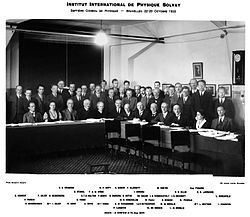Frederic Joliot-Curie
Jean Frédéric Joliot-Curie (born Jean Frédéric Joliot; Paris, March 19, 1900-ibid., August 14, 1958) was a physicist, chemist, and French university professor and received the Nobel Prize in Chemistry in 1935.
Biography
He studied at the Villa de Paris School of Physics and Chemistry, where he graduated in physics. In 1925 he was appointed personal assistant to Marie Curie at the Institut Curie in Paris. In 1926 he married Irène Curie —daughter of Marie and Pierre Curie, winners of the Nobel Prize in Physics in 1903—, with whom he adopted the common surname Joliot-Curie. At Marie's urging he received a doctorate in science.
A member of the French Academy of Sciences, in 1937, he was appointed professor at the College of France, a position he held until 1956, when, after the death of his wife, he took over her chair of physics at the Sorbonne in Paris.
Frédéric and Irene Joliot-Curie had two children: Hélène and Pierre.
He died on August 14, 1958 in the city of Paris, of liver disease.
Scientific research
Together with his wife, he began his research in the field of nuclear physics and searching for the structure of the atom, particularly in the structure and projection of the nucleus and which was fundamental for his subsequent discovery of the neutron and artificial radioactivity in 1934 In 1935 both scientists were awarded the Nobel Prize in Chemistry for their work in the synthesis of new radioactive elements.
During his stay at the College of France, he worked on chain reactions and the requirements for the construction of a nuclear reactor that used controlled nuclear fission to generate energy through the use of uranium and heavy water.
During the Nazi invasion of France, Joliot-Curie, an active member of the French Communist Party, took an active part in favor of the French Resistance. On August 20, 1944, coinciding with the liberation of Paris in World War II, He is appointed director of the Centre National de la Recherche Scientifique (National Center for Scientific Research, CNRS). On February 3, 1946 he was appointed high commissioner for atomic energy. In 1948 he supervised the construction of the first French nuclear reactor.
In 1955 he was one of the eleven intellectuals who signed the Russell-Einstein manifesto that urged the search for peaceful solutions to international conflicts existing at that time in the midst of the Cold War.
Frédéric Joliot-Curie was president of the Rationalist Union from 1946 to 1955.
Acknowledgments
He was awarded the Hughes Medal in 1947, awarded by the Royal Society "for his distinguished contributions to nuclear physics, particularly the discovery of artificial radioactivity and of the emission of neutrons in the fission process".
The Joliot crater on the surface of the Moon is named in his honor.
Contenido relacionado
Hercules
Sword
Battle of Arica

